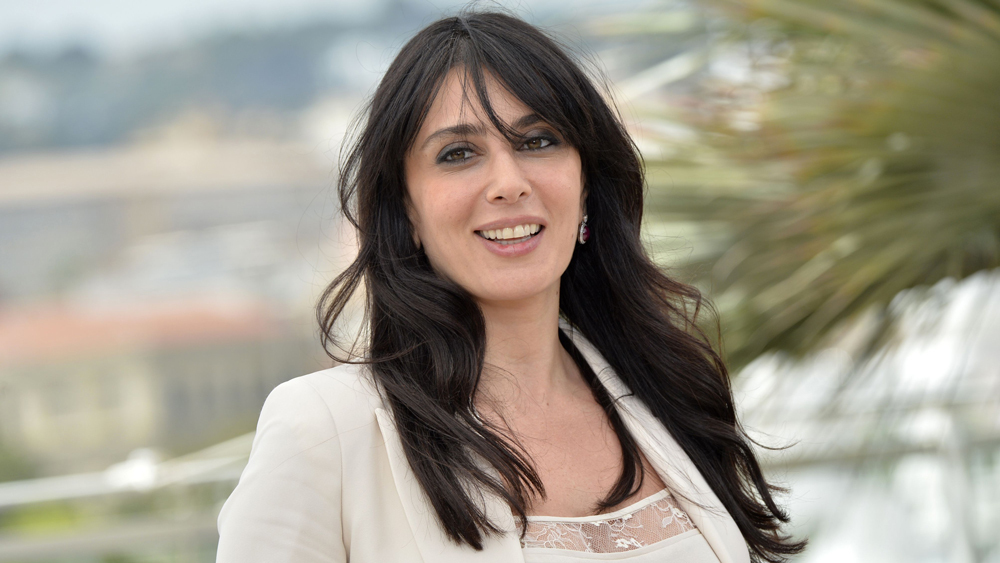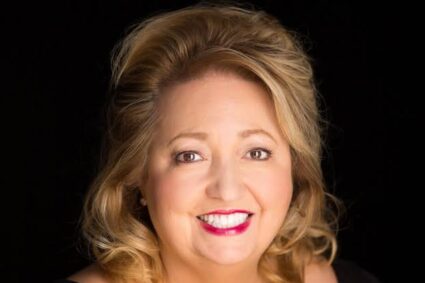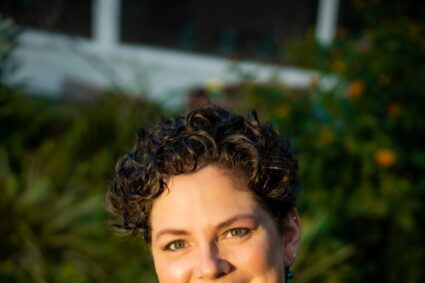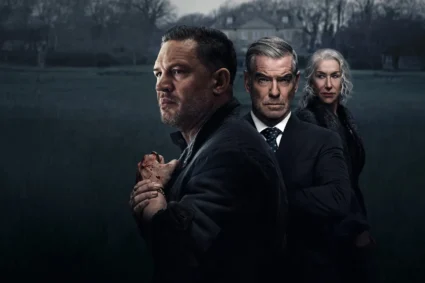
For our FINAL interview from the Middleburg Film Festival last fall, I sat down with the writer/director Nadine Labaki to talk about her latest film. Capernaum! Inside a court, Zain, a 12-year-old Syrian refugee boy, is brought before the judge. To the question: “Why are you attacking your parents in court?”, Zain answers: “For giving me life!” The film retraces the incredible journey of this child in search of his identity and who rebels against the life that was imposed on him. Here’s the inside scoop of our interview, enjoy!
Let’s talk about this wonderful film, which won the Jury Prize at Cannes Film Festival. And you dedicated it to the cast, who were mostly impoverished and or refugee children. So, tell me about the casting process of your film.
The casting process was a very—it was a street casting, so we went—my cast and crew went everywhere; Lebanon, and we interviewed a lot of kids, their families, their parents. And so all the casting is non-professional actors. They are people that are almost living in the same situation that they are portraying in the film. And this was a very important point, because I didn’t want it to feel like I was making a film. I just wanted to feel like I was telling a story of what is really happening and not just a fiction that I just sort of imagined in my head.
Now, the wonderful boy, Zain Al Rafeea, who played the young boy Zain. I read that when you found a picture of him, he looked similar to a picture you saw in a drawing. Is that correct?
It’s something similar to that. In 2014, I was coming back from a party and it was very late. It was 1:00 in the morning, and I see a child on the street. He was about one and a half years old or two. And he was on a sidewalk with his mom. It was a very, very tiny sidewalk. It wasn’t even a sidewalk. I don’t know what you would call it. He was dozing off and he couldn’t sleep. So, I think that was a turning point for me, because I thought, “how can we get to this point? How do we get to a point where we deprive this child from his most basic rights, which is just to sleep; just to close his eyes and sleep?”
And I felt responsible for that in a way; responsible because I keep going; I continue my life; I don’t do anything about it. I think it was a turning point for me, and I just decided that I wanted to do something about it, and I was wondering, what happens in his head? If this child was able to speak, what would he say? What would he tell me? So, I come back home and I start drawing, and I draw the face of this child. It was a child with his mouth wide open, and he’s shouting at a bunch of adults standing in front of him. And then we started working on the film. I forgot about the drawing for a little bit, but then, four years later—now, in 2018—I stumbled again on this drawing and it was very, very surprising at how much this kid looked like Zain. And it was Zain, four years before I even met Zain.
Oh, wow!
So, yes. Sometimes, you feel like everything is like the pieces of the puzzle that’s come together at one point and you start understanding why you get certain things and what lead you to do certain things, and so that was the story of the drawing.
That was an amazing story. I’ll have to admit, I’m almost getting teared up about it.
Aww!
So, why do you feel that the storyline of a boy suing his parents for giving him life is real essential to telling the story in your film?
It was really inspired by all those kids I used to see. Like I told you, I just wanted to express what those kids were feeling. So, I was wondering if I could give those kids a voice, what would they say? So, I used to ask them a lot of questions. We would discuss a lot, spend a lot of time. I used to see the same kids over and over in prisons, in detention centers, in the families, in their homes, on the street, all those kids that we used to see. And we used to ask the one question every time, which is, “are you happy to be alive?” And most of the times, unfortunately, the answer would be “no, I’m not happy. I don’t know why I’m here; I don’t know why did they give me life if nobody’s going to love me or nurture me, if I’m going to be beaten up everyday, if I’m going to be abused, if I’m going to be raped, if I’m never going to eat when I’m hungry, if I’m going to be left alone on the street, if I’m going to survive on my own,” all that. And it was really inspired by this anger that I used to feel. And they’re not only angry; they have a sense of justice that is very developed, and they know that what is happening to them is not right. Some kids don’t even have any more reactions, any more emotions. They’re just numb. They are in a state of shock. They’ve been so abused and so beaten up and so disrespected and treated like trash that they have nothing anymore. Nothing. They’re just kids who don’t play. Can you imagine a kid that doesn’t play, that doesn’t talk, that doesn’t sing, doesn’t laugh, doesn’t cry, nothing. So—
It would be a sad world, I’ll tell you the truth especially since I work at a school. And I work with kids from age toddler to all the way to second grade, so to see a kid not laugh or not cry or be a kid would be devastating.
Yeah, they’re deprived of their childhood. They’re not kids anymore. You know, some people might look at you with old eyes; eyes that have really suffered, and they’re not children anymore. You don’t see childhood in them anymore. Some of them don’t even have a sense of their value in life, because “they say we are trash, we are parasites, we are insects, we are nothing.” They don’t even know when they are born. Some of them—99% of them, actually, don’t even know their date of birth.
Nobody’s ever blown a candle for them; nobody’s ever told them, “I’m happy that you are here, that you are in my life. I want to celebrate your coming into this life,” so that they don’t have a sense of their value. Can you imagine millions of kids all over the world are living this situation, and can you imagine those kids growing up with no sense of any value of their being? So what are they going to become? We shouldn’t be surprised when we see a young man opening fire on random people on the street, or committing some act of criminal act or terrorism. We’ve marginalized so many people and so many kids, especially. I truly believe that the source of evil in the world is unloved children; unloved childhood, a neglected and abused childhood.
Absolutely. I’m almost just tearing up hearing about it. Oh my goodness. Wow, I need a moment. Alright. You and Mouzanar; he’s your co-producer—you did everything inside this building in Beirut, you did everything from writing the script, first reading, post production, music mix. It’s like your own in-house within one single building!
Yes, exactly. It’s a home made film, if you want to think about it. It’s a home made film. It’s something that we really wanted to do at home because we wanted to have the freedom to do whatever we wanted. So, Khaled, my husband, produced it, and he was thrown into that adventure without even wanting it, because—
Really?
He never produced anything in his life. It was—yeah, he’s a music composer, so—
Yeah, because he did all the music.
So, he was thrown into that adventure, because we needed that feeling. We needed to create our own space to work, to really work organically and work and listen to what the film needed and just go with the flow and shoot as much as we wanted. It was—you know, we shot for six months. Yes, and we have over five hundred hours of rushes and all that. So, it was not an easy task, but we decided to do it because we wanted this freedom. We wanted that.
That’s nice. I heard that the original cut of this film was twelve hours.
Twelve hours, yes.
How did you cut from twelve hours to two?
It was a very, very difficult and very heartbreaking process because you decide to take sometimes things you don’t even know if you should or not. And when you’re so much in it and you have your nose in it, you don’t really have the distance to really judge what you’re doing or to make sure that what you’re doing is right. You—unfortunately, we don’t have the chance to discover our friends like somebody watching this film for the first time, which I think is a blessing. It’s a blessing because it’s the only way to know what needs to be done. Unfortunately, we can’t do that, so I’m not sure about the results. I never know if what I did is the right thing. I’m still questioning myself. I keep waking up with this anxiety because I don’t know if I did the right thing or not.
Yeah, that’s the trouble when it comes to filmmakers, even editors like me. I read that you filmed this in chronological order. And I’d like to know what were some of the challenges of doing that, especially since you said you took six months to film this.
Yes, we shot in chronological order because it was important for the actors to understand what they were doing, and also to grow into the character, and to grow. Really, to grow, and because Zain grew during that shoot, and Unis grew and she started to—it’s a girl in real life. Her name is Treasure. And she actually started walking on that shoot and so it was important that we shoot chronologically, for those reasons and for the actors to really understand the story that they are telling. You know, they are not actors, so it’s difficult for them to—they’re not used to the process of being an actor, so it’s difficult, unless it’s chronologically it’s mission impossible, so yeah we shot it chronologically.
Absolutely, especially since you said you didn’t go by following the script directly. In other words, you didn’t go by scene here one or scene here two, but you captured the shooting and shooting until you get the best performance of your cast, especially since you said they’re not actors.
Exactly. It was—you know, it was a very precise procedure. Then we needed to spend time, we needed to navigate their truth to words, the fiction that was written. So it’s not easy. You don’t get to try it from the first shot. It’s impossible from the first take.
You need to shoot a lot and you need to—it was a nightmare for my editor to just take out my voice all the time because I was talking to them the whole time while we were shooting. So, I would come in the frame, interfere and come out. It’s a very organic process. It’s not at all structured, because usually, an actor is at the service at a certain pace or camera movement or whatever. This time, we had to do it the other way around, which is we have to adapt to their nature. We had to adapt—we should know how to navigate. We cannot be structured, we cannot be clustered in a certain structure. We had to be as free as they are in order to capture their performances. We had to be ready to be mobile, to really shoot a lot, and be ready to shoot in very difficult circumstances, and capture the moments no matter what happens. The word was “never stop shooting no matter what.” So yeah, so it was like that.
What do you hope audiences will take away from the film?
I think there’s a change, there’s a shift in perspective when I’m feeling the most. Like people come out of the film and they feel a little bit changed and that’s what I want. For me, films can really change you. It can really change something in you, or at least make you think about something. That’s what I’m expecting. I expect too much from those two hours that I spent in the movie theater. Usually, you want to go watch any random film, because there are two hours that you steal away from your life, with your busy life and everything that’s going on. Those two hours are important, so they have to count. They are—to me, it is as important as reading a book. It has to be somehow—it has to open your eyes or to be eye opening or to change something in you or to make you think about a certain problem or make you aware of a certain thing. I’m expecting, when I’m watching a film to come out of it changed.
Capernaum, IN THEATRES TOMORROW from Sony Pictures Classics. Special thanks to PR Collaborative, Allied Global Marketing and the Middleburg Film Festival for the arrangements. Many thanks to Nadine for the great interview.


